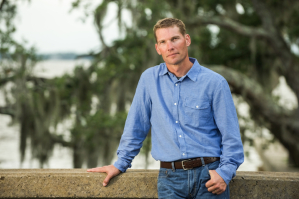The Mountain Between Us, a drama starring Idris Elba and Kate Winslet, releases this week from 20th Century Fox. Based on the book by New York Times bestselling author Charles Martin, the film tells the story of two strangers who are forced to rely on one another to survive after their plane crashes in the wilderness.
Together, Ben (Elba), a neurosurgeon, and Alex (Winslet), a photojournalist, must overcome a series obstacles -- including a wild cougar and broken limbs -- that inevitably unite them, both physically and emotionally.
Martin, a bestselling author of 12 other books, including Where The River Ends, recently spoke with The Gospel Herald about The Mountain Between Us, how the Psalmist David inspires his work, and his thoughts on "Christian fiction."

Below is the exclusive interview with Charles Martin.
GH: What inspired you to write the Mountain Between Us?
CM: One week after Christmas, I went on a hiking trip with a buddy of mine. As we got about halfway up the mountain, a blizzard blew in, and conditions got really bad. The wind was blowing sideways about 60-70 miles per hour. It was a little dicey, but I finally got set up in our tent. I'm sitting there at about midnight, and, of course, I write fiction, so I'm day dreaming. I start wondering, "What if this was the real deal? What if I wasn't just three miles from my truck? What if I really was out there?" My wheels are spinning as if I'm out there in that storm.
A week later, I'm on a plane flying out west, and I'm looking out over this massive mountain range. I thought to myself, "What if I had that experience and crash landed a plane down there? What if you crash landed with a woman who wasn't your wife? What if she was hurt?"
At the time, I'd been married for 14 years, and as I was asking those questions of myself, sort of taking inventory, I starting thinking, "I tell my wife I love her all the time, but how do I show her?" What would Christy say if she were asked, "Does Charles show you he loves you?" That's where this book came from.
GH: So in some ways, this story is a love letter to your wife
CM: Yeah, definitely. But, if you look at my other books, you would find that it's true with a lot of them. Christy is my only experience, she's the only woman I've truly known. So in all my books, I think the female characters very much reflect her.

GH: I read in an earlier interview with you that you identified the Psalmist King David as the "greatest author of all time." Why is that?
CM: I don't know if he's the best, but he's certainly my favorite (laughs). He speaks what my heart needs to hear when I'm hurting, or in a place of uncertainty. David poured out his soul, everything from repentance to praising the Lord. His work is the honest wonderings of a man in struggling. He says what my heart needs to communicate. I'm also thankful for Paul and Peter and John and the writer of Hebrews, but in terms of, if I have to name one, I couldn't not pick David.
GH: You are a man of faith - how does your relationship with Christ influence your work?
CM: I grew up in a house where Jesus was and is Lord. He wasn't this faraway guy, he was this close Father. I don't remember many nights where my folks didn't pray for me -- I just woke up and I walked with Jesus. That's what I do. I don't always get it right. When Paul says he's the "chief among sinners," I disagree -- I think I am. But, I am a man under authority, so when I think about my stories, I get a lot of joy and delight knowing they reflect the character of God. Matthew says, "For out of the abundance of the heart the mouth speaks." If God is actually in there, then what I do ought to reflect that.
I never want to beat somebody over the head with an agenda, I want to express love and write stories that lift up God's nature and character. Obviously, I'd love to be on the Times list again, but if broken people can find something hopeful in my stories, then I'm satisfied.
GH: What are your thoughts on overtly "Christian fiction?"
CM: Not to knock anyone's work, but that, to me, seems to be agenda driven, and that's not my process or style. I don't know how to do that, and I like the way I tell stories. I think they reveal the character of Jesus in a way that speaks to our hearts. That's the way that I make art. C.S. Lewis said one of the things he hoped for his stories is that they would become road signs to Jerusalem. He calls them "signposts." That's exactly how I feel. My stories point people to Jesus, and hopefully, He will then reveal Himself to them.
GH: What makes up a good story, in your opinion?
CM: For me, it's being a character that is flawed and broken with whom you can empathize and appreciate their brokenness. Then, you watch them authentically and honestly walk out of brokenness. That is redemptive, and that is a good story.
GH: What do you want audiences to take away from The Mountain Between Us?
CM: I hope they see a man who dearly loves his wife with real honor and integrity and strength, but at the same time offers kindness to a total stranger and it's a really neat friendship that they develop. It's a tender love story. I hope readers walk away with the idea that hope wins and loving a wife is really worth it. If they walked away with that, I'm done.






